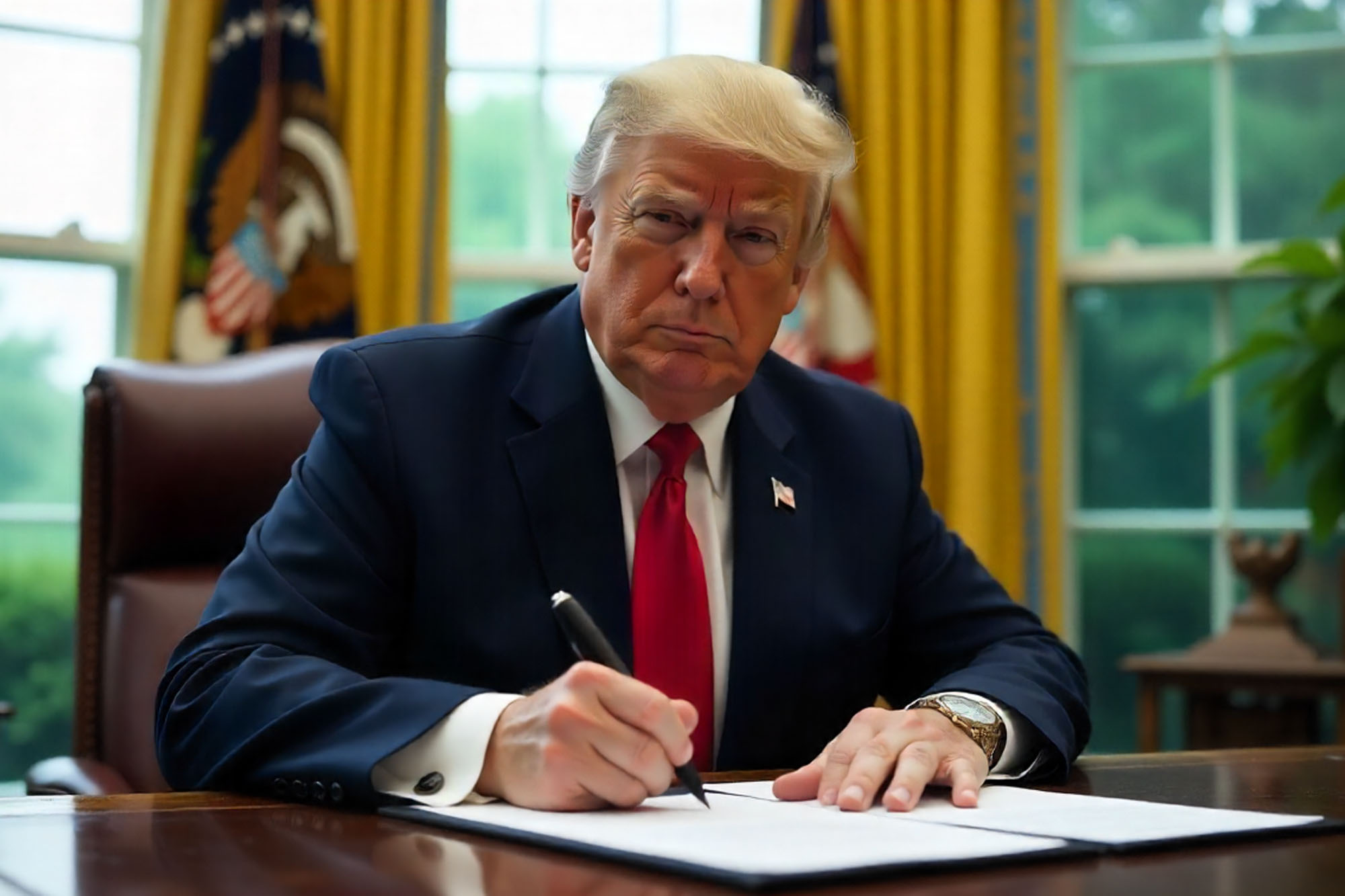President Donald J. Trump signed a proclamation on Friday night that will impose a new $100,000 fee on H-1B visa applications set to go into effect at 12:01 a.m. EDT on September 21, 2025. This has left employers and highly skilled professionals with more questions than answers. Because of the urgency and importance of this policy change, we are issuing this emergent notice. Updates will be provided hereinafter as we learn more.
This article addresses the new H-1B proclamation and its impact, which will result in a complicated and uncertain path for this necessary visa for learned and skilled professionals and their employers.
1. The New Proclamation: What the New H-1B Visa Fee Means
President Trump signed a proclamation titled “Restriction on Entry of Certain Nonimmigrant Workers”, imposing a $100,000 fee for each new H-1B beneficiary. Initially, it seemed that it would be for any H-1B beneficiary who seeks to enter the United States after the effective date of 12:01 EDT on September 21, 2025, but over the weekend, the White House indicated that it would only apply to new H-1B petitions and their beneficiaries.
The U.S. Chamber of Commerce and other business groups have already indicated that such a unilateral fee increase is a “new tax on businesses” and an unconstitutional overreach. They have been successful in prior challenges to fee increases. This basis of opposition, combined with a legal framework that has previously challenged executive power for domestic purposes, makes a successful legal challenge to this proclamation very likely. The President signed the order late Friday evening, affording businesses no viable time to plan for such a drastic change. It is expected to be challenged and potentially blocked by a federal court injunction while the case is litigated.
The White House and CBP have clarified that current H-1B visa holders are exempt. Although the clarification states that it will not apply to beneficiaries of previously approved petitions, beneficiaries of petitions filed prior to the effective date, or those in possession of H-1B visas, it remains unclear if it applies to those seeking H-1B visas after the effective date. CBP issued a statement on X that current H-1B visa holders are exempt and can safely return to the United States.
2. Summary of the Proclamation
- The Proclamation will ban H-1B employees’ entry unless the $100,000 fee is paid by the employer, and this payment must accompany any new H-1B visa petition. The White House clarification stated that this will apply to new petitions submitted after 12:01 on September 21, 2025.
- The fee, together with an entry ban, will apply to any future H-1B petitions.
- Exceptions to the ban are possible for an H-1B employee based on their circumstances, employees working for a particular company, or foreign nationals working in a specific industry, if, in the agency’s discretion, employment of the H-1B foreign national is found to be in the national interest and does not pose a threat to U.S. security or welfare.
- The proclamation’s restrictions will be valid for 12 months but may be extended on the recommendation of immigration agencies.
According to this proclamation, the restriction for entering the U.S. for H-1B employees will apply to all foreign nationals who seek to enter the United States on or after the effective date unless their petition is accompanied or supplemented by a payment of $100,000. The White House and USCIS clarified that this fee will not apply to approved or existing petitions that were submitted following the effective date of September 21, 2025, at 12:01 EDT. Employees outside the United States who already have an H-1B visa can return to the United States. For new cases, the Department of State is to collect the amount at the time of the visa issuance or its renewal. Failure to pay the fee will result in a suspension of a decision on the H-1B visa and petition.
The proclamation itself differed from the White House fact sheet, and a day after the proclamation, it stated that those who already have a valid H-1B petition or visa approved or accepted prior to the effective date are exempt from the fee. In addition, H-1B renewal applications are also exempt. There remains a lack of clarity for those in possession of an H-1B petition but without a visa, and whether such individuals will be subject to the new fees if they seek an initial visa. As a result of the lack of clarity, travel in the immediate future without an already existing H-1B visa is not advisable until the actual parameters of the policy and its implementation are made clear.
Other procedures remain unclear. The White House has issued a directive to DHS to implement rules, which will occur in the future, to implement this new program. As a result, many of the procedures are not yet in effect. For example, the procedure for the national interest exceptions to the entry ban within the proclamation has not yet been elucidated.
Similarly, although both the Department of Homeland Security and the Department of State have been instructed that the $100,000 fee must be paid prior to approving an H-1B petition or granting an H-1B visa, the procedure for paying the fee has not yet been provided.
Additional Instructions That Are Part of the Proclamation
The President’s Proclamation also instructs the DHS to commence changes that would prioritize the highest-paid workers as well as those most qualified. A proposal from the agency for a weighted system for allocating H-1B visas has already been approved by the Office of Management and Budget and is expected to be published for comment forthwith.
The Proclamation further directs the Department of Labor to consider changes to its prevailing wage determinations. This new regulation would also have to go through a published notice and comment period. Similar changes in the past Trump administration were blocked by the courts as procedurally defective.
The Legislative Overhaul: The American Tech Workforce Act
Legislative changes, as opposed to a Presidential order, are also in the works to revamp the H-1B visa. A bill was introduced by Senator Jim Banks titled the “American Tech Workforce Act” in an effort to legislatively change the H-1B program. This bill would fundamentally change the H-1B program through three main proposals:
- A substantial minimum Wage Increase: The bill would raise the minimum wage for H-1B visa holders from the current minimum wage to a new, much higher wage floor of $150,000.
- Elimination of the OPT Program: The bill would end the Optional Practical Training (OPT) program, which allows foreign graduates to work in the U.S. for up to 3 years in STEM fields following graduation.
- A New “Highest-Bidder” System: The current lottery system would be replaced with a system that prioritizes visas for employers who offer the highest wages.
In order for a bill to become law, it must be approved by the Senate and the House of Representatives, which seems unlikely at this time because of the narrow margins. If the bill passes both Chambers, it is likely that the President will sign it.
3. The Bigger Picture: H-1B Visas and the Economy
This proclamation continues the Administration’s actions of implementing legal action through Presidential proclamations, Executive Orders, and Actions without the US Congress. Signed on Friday evening with an enactment of Early Sunday morning, with a change issued by USCIS on Saturday afternoon, the proclamation caused confusion and disquiet for employers and employees and did not afford businesses and their employees sufficient time to understand the implications and take proper responsive action. Indeed, the procedure to even pay this new H-1B fee has not even been established. The chaos was minimized somewhat by the clarification that it would apply to only new petitions, although some of the confusion still remains.
This new fee will be highly disruptive to businesses’ operations and detrimental to their educated and skilled employees. It will also likely impact the U.S. economy. A policy brief from the National Foundation for American Policy found that H-1B visa holders don’t harm U.S. workers. The study, which analyzed data from 2005 to 2018, found that a greater presence of H-1B workers is associated with lower unemployment rates and faster earnings growth for U.S. workers in the same field. This research shows H-1B visas boost employment and wages for American workers rather than displacing them.
Research from the University of Chicago and the National Bureau of Economic Research (NBER) also found that H-1B visa admissions directly contribute to increased patenting and innovation, with very little impact on native inventors. This means H-1B workers aren’t “crowding out” American innovators but are instead making direct contributions to U.S. technology formation.
Conclusion: Navigating the Uncertainty with a Trusted Partner
The current H-1B landscape arising from an executive proclamation will impose a huge financial burden on employers and their employees. The new fee’s implementation must still be created. It will likely face immediate legal challenges and a period of uncertainty. During this period, employees and employers should consult competent counsel for the latest developments.
For employers and foreign professionals, this uncertainty demands experienced legal advice. Oltarsh & Associates, P.C. will continue to keep you informed and provide the legal strategies you need to secure your future in the U.S.
Contact us for a consultation if you have questions about how these proposals affect you or your business.





